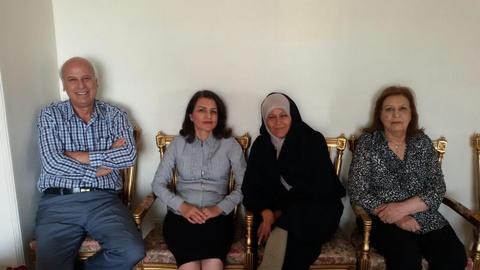Iran's key military commander and President Hassan Rouhani have declared that ISIS has been defeated in Syria and Iraq.
In a letter to Iran’s Supreme Leader Ayatollah Khamenei on November 21, General Ghasem Soleimani, the commander of Iran’s expeditionary Qods Force, announced that the days of the Islamic State in Iraq and Syria are over.
Soleimani’s announcement is right on target with his prediction about the demise of the militant group. On September 21, he said Islamic State, or ISIS, would be defeated within two months.
“This humble person,” wrote Soleimani, “as a soldier called upon by your eminence to serve on this battlefield, announces the termination of the rule of this vicious cursed entity, following the completion of the liberation operation of Abu Kamal as ISIS' last fort, bringing down the flag of this US-Zionist made terrorist group, raising the flag of Syria.”
The letter praises Ayatollah Khamenei for “mobilizing all resources” in the fight against ISIS.
On November 20, the Iranian Students’ News Agency (ISNA) reported that General Soleimani had personally planned and led the operation to liberate Abu Kamal [also referred to as Al-Bukamal] in the Deir Ezzor province of eastern Syria near the border with Iraq [Persian link]. On the same day, leader of the Lebanese Hezbollah Hasan Nasrollah delivered a speech thanking General Soleimani for “his great role in fighting ISIS in the city of Abu Kamal.”
Five Iranians were killed during the operation, including General Kheirollah Samadi, a senior commander of the Qods Force.
Pointing the Finger at the US
Soleimani’s letter to Khamenei also reiterated Iranian claims that the United States had backed ISIS. “All these crimes” said the letter, “have been designed and implemented by US leaders and organizations, according to the acknowledgement of the highest-ranking US official who is currently president of the United States. Moreover, this scheme is still being modified and implemented by current American leaders.”
But while he criticized the United States, Soleimani stopped short of accusing Saudi Arabia of the same crime — at a time when Iranian media has specifically targeted the kingdom.
He said it was not yet possible to calculate the full damage caused yet, but “the preliminary investigation estimates damages to be around $500 billion” in Iraq and Syria.
Soleimani’s letter also praised the Iraqi “Popular Mobilization Forces (PMF), Al-Hashd Al-Sha'abi, and other Muslim youth from other countries with the prominent presence of Hezbollah led by its great leader, Seyyed Hassan Nasrallah [who] played an important role in overturning this dangerous event.”
He also had praise for the “wise leadership and guidance of his Excellency, Ayatollah Sistani [the spiritual leader of Iraqi Shias], who mobilized all facilities to deal with this toxic storm.”
Soleimani extended thanks to Afghan and Pakistani fighters and the governments of Iran, Syria and Iraq. But he made no mention of Russia, whereas two months ago he declared that Iran, Syria, Iraq and Russia would celebrate the downfall of ISIS together.
His failure to mention Russia’s role came just as talks between the Syrian president Bashar al-Assad and President Vladimir Putin were underway in Russia. However, this omission says more about Soleimani’s desire to portray the victory over ISIS as a purely Shia accomplishment without any reliance on foreign powers rather than a sign of any rifts between Iran or General Soleimani and Russia regarding the fight against ISIS or any other regional policies.
Rouhani Also Declares Victory
President Hassan Rouhani also announced the end of ISIS on Tuesday. “Today with God’s guidance and the resistance of people in the region we can say that this evil has either been lifted from the head of the people or has been reduced,” Rouhani said in an address broadcast live on state TV.
Like Soleimani, Rouhani accused the United States and Israel of supporting ISIS. And he also took the opportunity to criticize Arab powers in the region, asking why they had not spoken out about civilian deaths in Yemen. The eradication of ISIS from Syria was very good news for the Iranian nation and the peoples of the region, he said, again agreeing with Soleimani, and added that "the bulk of the work was done by the people and armies of Syria and Iraq, with the help of countries of the region, especially the Islamic Republic of Iran.” He criticized the Arab League, which met on November 19 in Cairo, calling it “an old, worn, exhausted and ineffective organization” and said it was “regrettable” that it had nothing more constructive to do than denounce “the Yemeni people” — referring to the Houthis — for striking back after “enduring two years of aggression.”
During the emergency meeting on November 19, the foreign ministers of Saudi Arabia and other Arab states criticized Iran and its Lebanese Shia ally Hezbollah and called for a united front to counter Iranian interference.
visit the accountability section
In this section of Iran Wire, you can contact the officials and launch your campaign for various problems


























comments